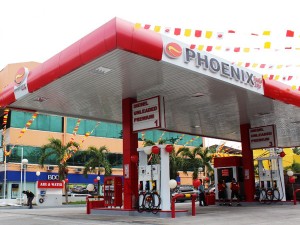Phoenix Petroleum eyes doubling outlets to 500 in next 5 years

The Phoenix gas station in along Putatan National Road in Muntinlupa City, which is Phoenix Petroleum's 64th station in Luzon and 235th nationwide. Phoenix Petroleum Philippines on Wednesday, July 11, 2012, said it plans to double its nationwide distribution footprint to 500 outlets in the next five years. PHOTO FROM PHOENIXPHILIPPINES.COM
MANILA, Philippines—Phoenix Petroleum Philippines Inc. plans to double its nationwide distribution footprint to 500 outlets in the next five years while expanding commercial space offered for lease in selected outlets to complement its selling of petroleum products.
In a press briefing after celebrating its fifth year of listing on the Philippine Stock Exchange on Wednesday, Phoenix co-founder and president Dennis Uy said that after ending June with 255 stations nationwide, the company would likely hit the 300 mark by the year’s end.
“We’re opportunistic. We hope to grow to at least 500 in the next five years,” Uy said.
The company has rolled out about 71 outlets in Luzon while the rest are in Visayas and Mindanao (Vis-Min) where it first established its niche in 2005. The company has since then grown to be the country’s leading independent downstream petroleum company out of about 70 players. It has a nationwide market share of about 6 percent.
“There’s opportunity to be a significant player coming out of the (oil industry) deregulation,” Uy said.
Asked why his group did not set up a petroleum distribution business soon after the oil deregulation in 1998, Uy said it took sometime because “it’s a challenging industry that needs lots of capital and the margins are quite small.”
Nevertheless, Uy said the country’s favorable economic prospects were providing room to grow the business. In the last five years, Phoenix’ revenues posted a compounded annual growth rate of 85 percent, outpacing the local industry, given that it had come from a low base. “We’re not expecting to be 85 percent because we already have a large base,” said Chryss Alfonsus Damuy.
Phoenix last year booked P27.47 billion revenues and P510 million in net profit.
Asked about growth areas, Uy said prospects in Mindanao remained strong due to less competition, adding that there was room to grow even in Luzon and even within Metro Manila. Out of the 71 outlets in Luzon, 11 are in Metro Manila.
To increase market share, Uy said, part of the strategy was to be quick in finding locations and once every new outlet has been set up, to develop very good relationship with customers.
About 34 percent of the company’s sales are from wholesale buyers such as transportation, shipping, airline, resellers and other industrial users while the rest are taken up by the retail market.
This year, the company has set a capital spending plan of about P1.6 billion, which is in line with the average capital expenditure budget of P1.5 billion in the last three years, Damuy said.
Likewise part of the business model is to grow the company’s leasing portfolio, albeit the property play is just “incidental” to the business, Uy said. The company operates a fully developed industrial park called Phoenix Petroterminals & Industrial Park Corp. (formerly Bacnotan Industrial Park Corp.) in Calaca, Batangas, where it keeps a large depot.
Some of its sites are operated by business partners or franchisees and for company-owned stores, the lots are usually only rented. But for very good locations, Phoenix acquires the property to add to its portfolio.
Phoenix also plans to set up mega-stations in selected areas. Its biggest so far is a one-hectare station that will soon rise in Davao City offering not just pump loading services but likewise leasing out space to other retailers and dining establishments.
